- MathNotebook
- MathConcepts
- StudyMath
- Geometry
- Logic
- Bott periodicity
- CategoryTheory
- FieldWithOneElement
- MathDiscovery
- Math Connections
Epistemology
- m a t h 4 w i s d o m - g m a i l
- +370 607 27 665
- My work is in the Public Domain for all to share freely.
- 读物 书 影片 维基百科
Introduction E9F5FC
Questions FFFFC0
Software
Presented at Emotions: Rationality, Morality and Social Understanding, Tartu, Estonia, September 7-9, 2017.
Expecting What We Don't Wish:
The Source of Anger, Hate, Relief and Depression.
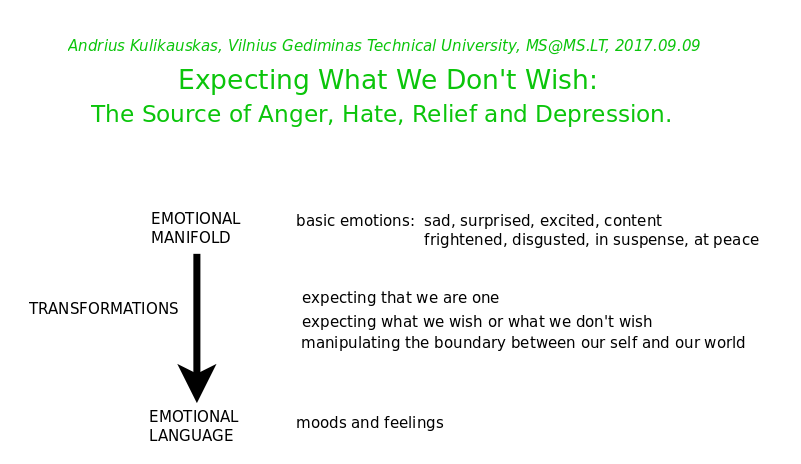
I describe a model of our emotional life which includes an account of moral and social feelings. From this model it will become apparent that the purpose of our emotional life is to help us understand our expectations, engage them and learn from them. First, I will show how the consequences of our expectations give rise to a set of basic emotions by which we distinguish our self and our world. This yields a map of an emotional manifold which we navigate and transform to define and redefine ourselves. Next, I will explore how our morality arises from our expectations about our expectations, and especially, our fundamental wish to consider us all as one self living in different worlds, rather than as different selves living in one world. In particular, we experience healthy emotions, including sadness, when we expect what we wish, but unhealthy emotions - anger, hate, relief and depression - when we expect what we don't wish. Finally, I will show that by studying poems we can learn how all manner of moods and feelings can be evoked, reproduced, mulled, described and shared as transformations of the boundary between our self and our world. In summary, I will describe our emotional life as our experience of an emotional language which transforms our emotional manifold.
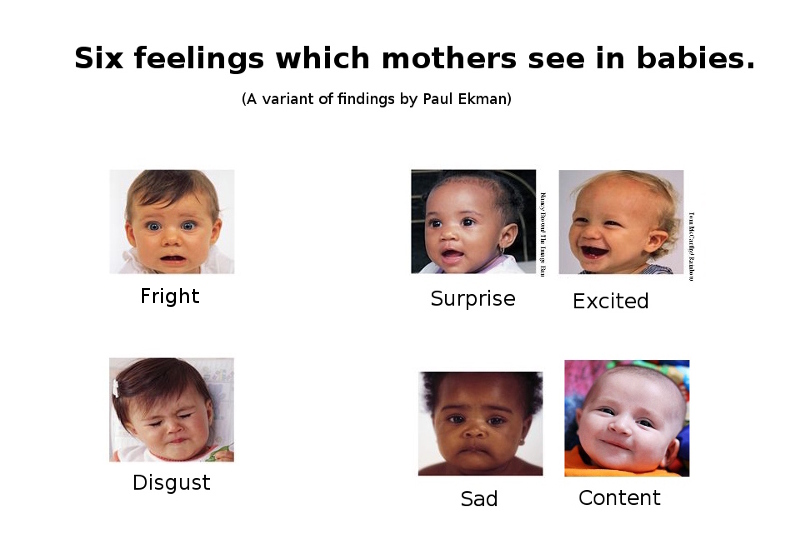
A first step is to model our most basic emotional responses. I started with six responses which are essentially those which psychologist Paul Ekman found can be observed in the faces of young infants, namely: happiness, sadness, excitement, surprise, fright and disgust. What is the simplest way that I might evoke these responses within myself? I once read that we are struck by existential sadness when our deeply held assumptions turn out to be wrong. So I imagined myself as a child playing with alphabet blocks. I would pick up a block, guess what letter was on the other side, and see if I was right.
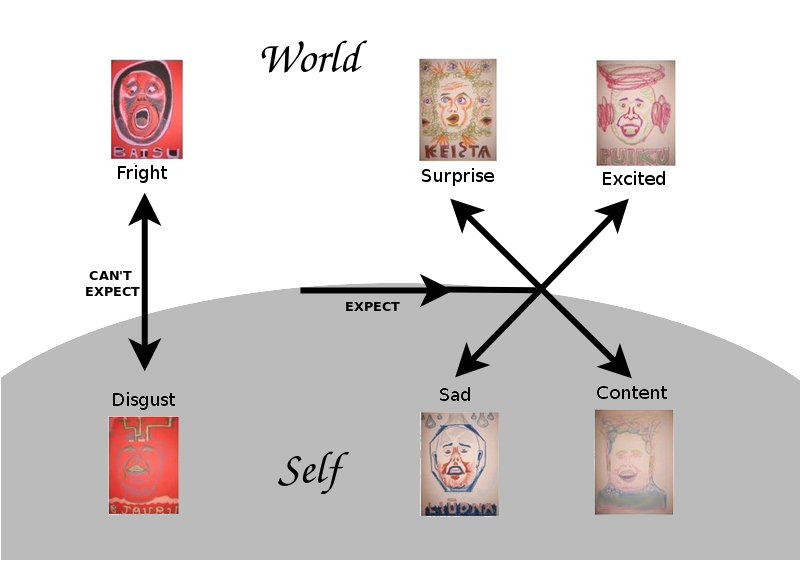
Suppose I don't know the block very well. If I guess wrong, then I am surprised, but if I guess right, then I am excited. However, if I know the block with absolute certainty, if I can't imagine I could be wrong, if my self and my world depend on that, and yet indeed I am wrong, then I feel devastated, but if I am right, I feel content and assured. And so by such introspection it is clear that our cognition grounds our emotion. A crucial distinction is between that knowledge which we personally identify with, by which we define ourselves, and that knowledge which is more distant, exploratory, theoretical. Furthermore, when I experience what I can't in any way expect because it is too sudden, too strange or too undesireable, then if it comes from beyond, I am frightened, and if it comes from within, I feel disgusted.
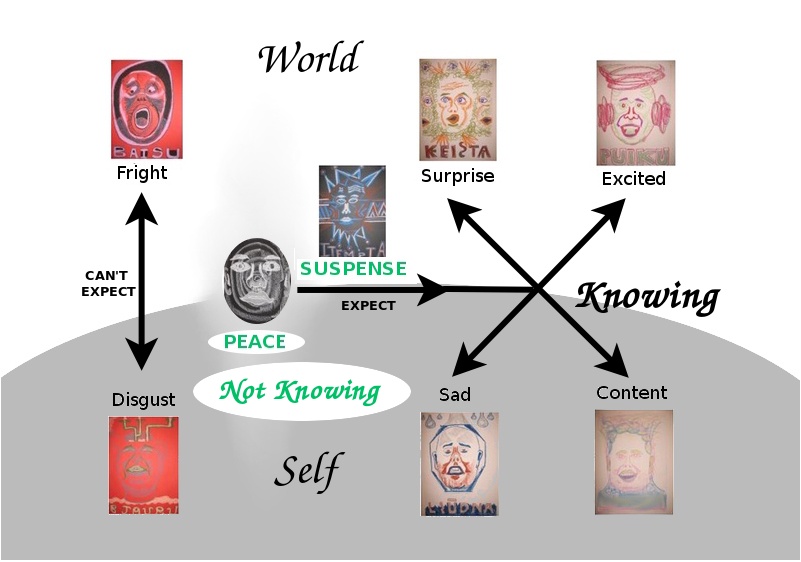
The structure of this model gives subjective meaning to the facial expressions we observe. It also makes sense of two emotional responses which we can introspect but which we do not and cannot observe, namely peace and suspense. We feel suspense after we have made an expectation and before we know whether it has been met, and we feel peace when we make no expectations. These are responses of not knowing, whereas the other six are for knowing. We see from this model that seeking peace (which has us be sensitive to all emotions) and seeking happiness (by avoiding sadness) are two very different approaches to living.
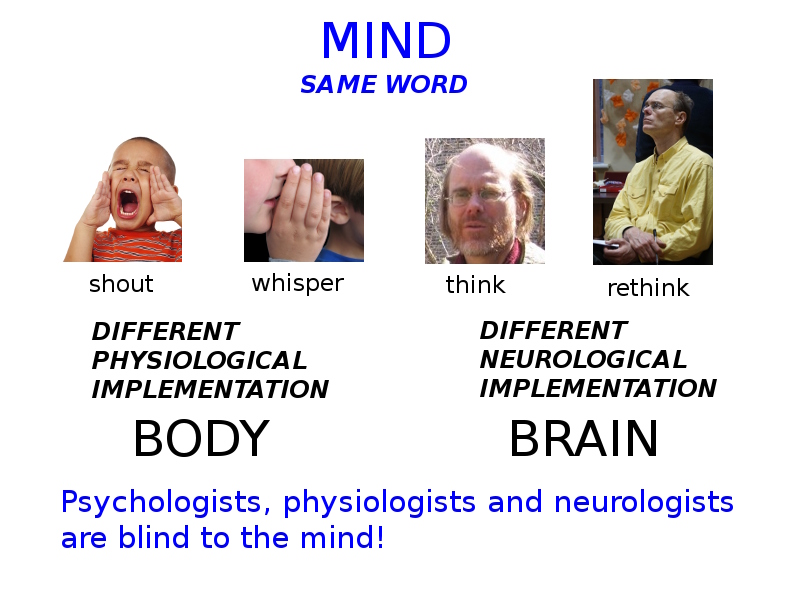
We can thus evoke distinct, basic, pure, vivid emotional responses by manipulating abstract expectations. It is remarkable that psychologists have not appreciated the significance of our imagination's ability to evoke feelings. They focus on physiology and conclude that there are no basic emotions, indeed, no reproducible emotions, because they lack any consistent expression. It is as if they were linguists for whom shouting and whispering were different activities and who never understood that they may convey the same name. It is as if they thought that the principles of mathematics are somewhere to be found in the particulars of a computer's hardware and software implementation of addition and subtraction. They do not appreciate the mind as an abstract system of activity which maintains a coherence that need not have any particular neurological analogue.
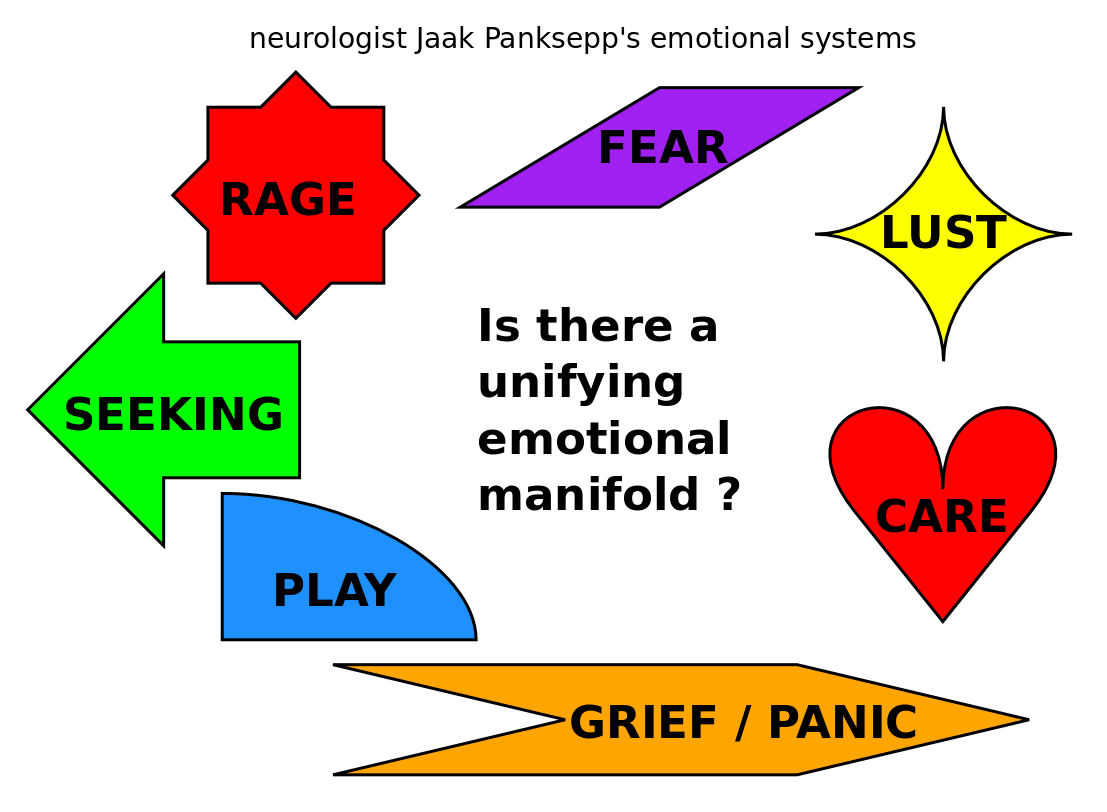
Neurologists such as Panksepp point to particular emotional systems, which he termed FEAR, RAGE, LUST, CARE, GRIEF/PANIC, PLAY and SEEKING. It makes sense that these disparate systems developed to serve specific evolutionary purposes. However, neurologists and psychologists have not recognized that our mind experiences a single emotional manifold which integrates distinct emotional systems, just as it has a sensory manifold which integrates vision, sound and touch. They don't consider the system as a whole, and so they aren't aware of externally nonobservable feelings such as peace and suspense, but are instead prone to making dubious claims about particular feelings. Thus Panksepp imagines that rats in the SEEKING mode are experiencing euphoria because they choose that state to the point of death by exhaustion, and yet it seems much more likely that the rats are feeling suspense, which even at low levels can keep humans playing video games interminably. And Panksepp claims that happiness is the evolutionary goal of life. But if we realize that happiness is just a symptom, then it becomes meaningful instead to seek peace so that we gain wisdom from being sensitive to the feedback of a variety of feelings.
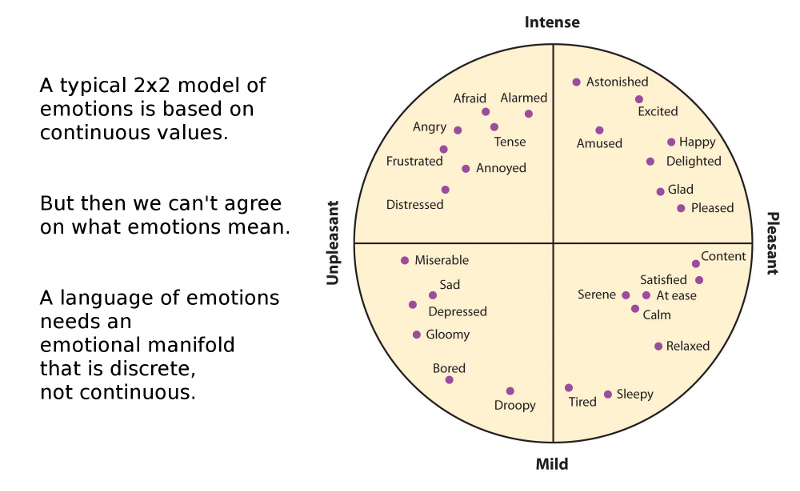
The typical 2x2 models which psychologists do appeal to are based on continuous variations, as if they were spectrums of sounds or colors. Such continuous models are completely inappropriate for supporting an emotional language because they lack features for drawing distinctions. A language must be based on structural distinctions as we have with musical scales or phonetic contrasts. Psychologists have thus not recognized that feelings derive from our expectations, whether we can make them or not, whether they are met or not. Psychologists are not aware that the central theme of our emotional language is drawing a distinction between our self and our world.
We are able to compare our many feelings as if they belonged to the same system. This suggests that our brains have a neurological map of our emotional system just as our brains have maps of our body. But the reality of this manifold is not in any particular map but in the fact that a feeling is located in the same place on that map whether we simply imagine it or whether tears fall from our eyes as we experience it. Similarly, a word is the same whether we hear it in our minds or we speak it with our vocal chords.
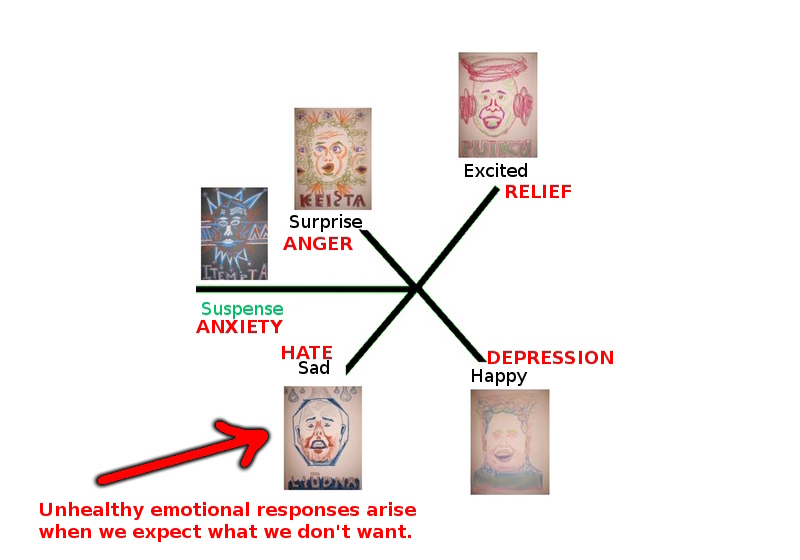
Next, I explain how a moral dimension arises when we make expectations about our expectations, for example, when we judge that our expectations will likely not be met and thus we become anxious that we will be sad. Negative moral tones arise when we expect that which we do not wish. Reflecting on this discord, our suspense becomes anxiety. If our suspicions are confirmed, then we feel hate (rather than sadness) and anger (rather than surprise). If our suspicions are refuted, then we feel relief (rather than excitement) and depression (rather than happiness). For example, if I expected to find my bicycle where I left it, then I will be surprised if I don't; but if I expected it to be stolen, then I will be angry if it is, but relieved if it is not. If I expect my sweetheart is true, then I will be distraught if she is not; but if I expect her to be unfaithful, then I will feel hate if she is unfaithful, and if rather she is not unfaithful, then I will feel depressed because I have meanwhile invested myself in a mistress who I do not care for. Similarly, if I turn my back on my dream of becoming a movie director, and I commit myself to working in a factory in Ireland, then I will feel depressed, entrenched and incapacitated if I do have the chance of going to film school. We thus find that depression occurs precisely when we could have been happy (because what we wanted to expect actually happened) but instead we feel incapacitated (because we wrongly expected what we did not want).
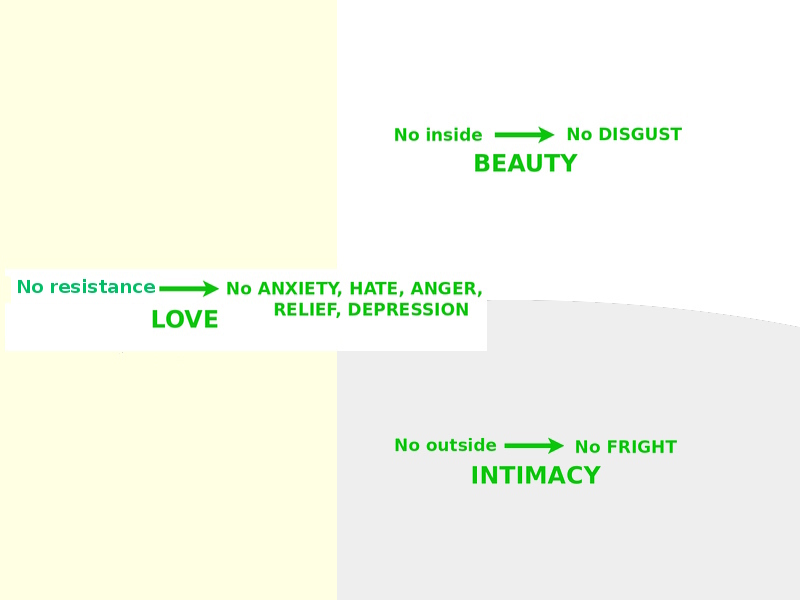
We feel positive moral tones as the impossibility of negative moral tones. For example, if we only expect what we truly wish for, then we feel love as the impossibility of hate. If we perceive that everything is outside of us, then disgust is impossible, and so we feel beauty. If we perceive that everything is within us, then fright is impossible, and so we feel intimacy. Thus we feel love, beauty and intimacy not as our own emotional responses, but rather as afterglows, emanating from our environment - loving, beautiful, intimate.
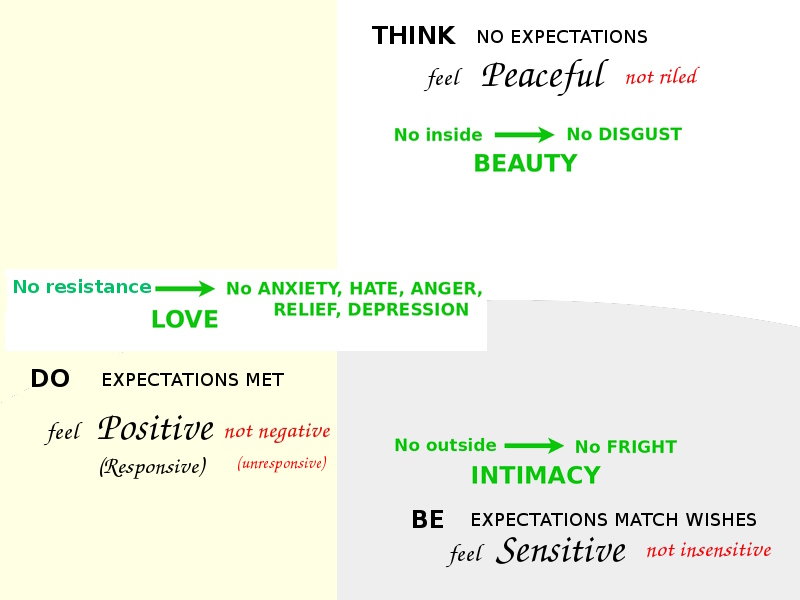
Our expectations are essential as we learn in life: taking a stand, following through and reflecting. Our feelings give us feedback on our learning. Ar we being, doing and thinking correctly? When we are being as we should, then our expectations match our wishes, and so we are sensitive, but otherwise insensitive. When we are doing as we should, then we are meeting our expectations, and so we are feeling positive, but otherwise negative. And when we are thinking as we should, then we have let go of our expectations, we are not prejudiced by our selves and our world, and we feel at peace, not riled. Thus we can embrace our expectations to inhabit our selves and be sensitive in our world, we can respond wholeheartedly, and we can then let go of our expectations to be at peace and think fresh.
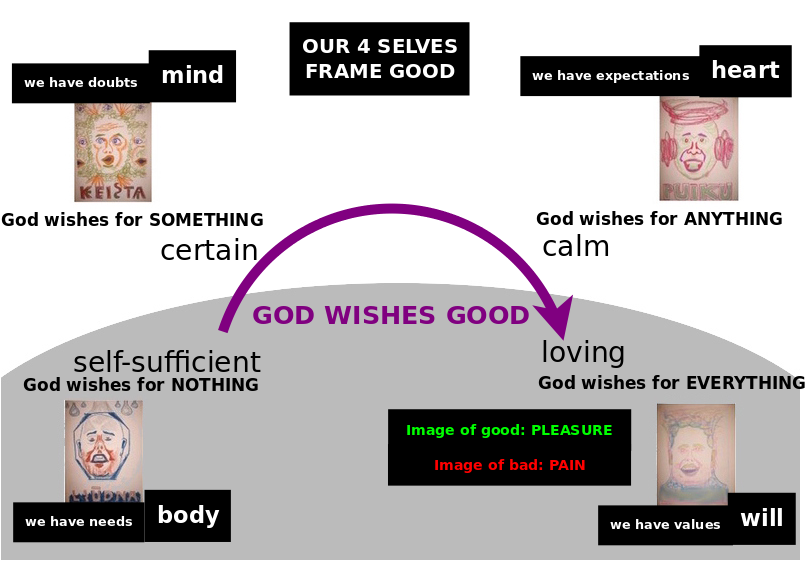
Our emotional life allows us to consider our selves in this world. Who do we take ourselves to be? Are we all simply one and the same being who inhabits a variety of worlds? Or are we a variety of beings together in the same world? Accordingly, do I choose to live as a person-in-general doing what any good person ought to do? Or do I choose to live as a person-in-particular and focus on what is specific to me? Our emotional life frames this fundamental moral choice by allowing us to identify our self with all or with one.
I find it helpful to contrast us, in conditions, with God, beyond conditions. This unconditional God wishes for conditional good. God wishes for nothing - is self-sufficient - but we have bodies with needs; God wishes for something - is certain - but we have minds with doubts; God wishes for anything - is calm - but we have hearts with expectations; God wishes for everything - is loving - but we have wills with values. In general, God lives by not knowing but simply wishing - and similarly, we don't know what we should be doing in life - but we are creatures of expecting and knowing, and we do know when we go astray. Our paradoxical challenge in life is to focus on that knowledge - our own personal deepest value in life - which directs us on that path of not knowing but wishing. Our body, mind, heart and will offer, in the form of pleasure, that image of what is desirable, but it is only an image, just as we might see ourselves in a mirror, and even our own self is but an image. Likewise, pain is but an image of what is undesirable. We are free to dedicate ourselves to our personal pleasure. We are free to transform or even ignore our sense of pleasure and pain. We are free to identify with a God who has taken up our conditions but is truly beyond them. We are free who we choose to take ourselves to be.
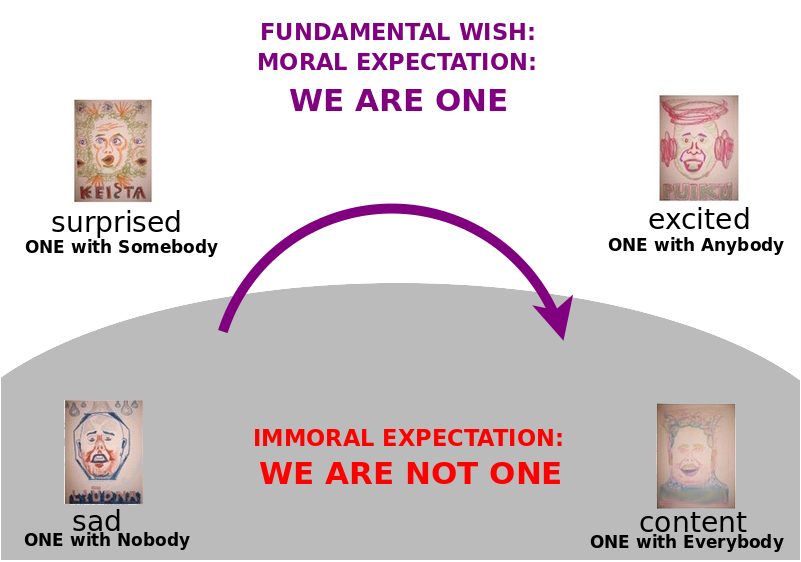
What do we truly want? We can study our feelings to infer what our expectations must be. I studied Jesus's emotional responses in the Gospel of Mark to deduce Jesus's expectation that we all are one. I imagine that we all wish to live one with God and all. We are sad to be one with nobody, surprised to be one with somebody, excited to be one with anybody and happy to be one with everybody.
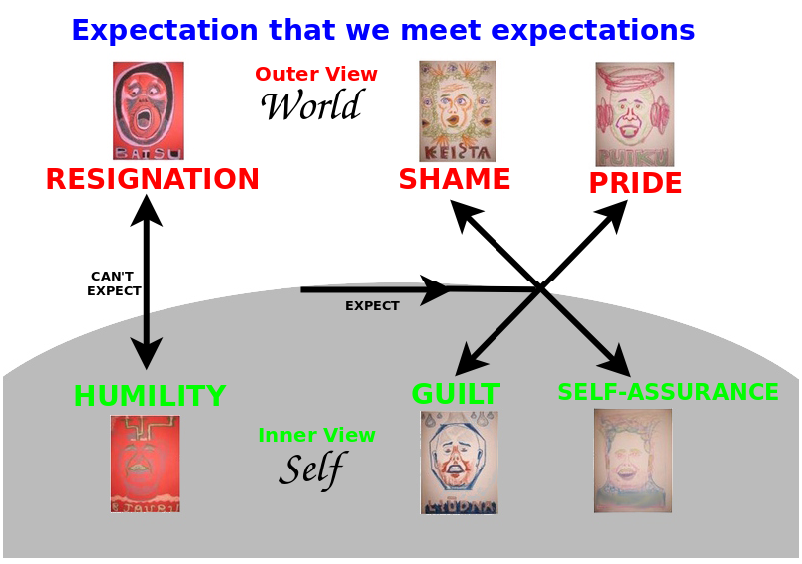
The moral distinction between an inclusive self and an exclusive self is evident in emotional responses arising from expectations about expectations.
An inclusive self naturally honors each individual as the best interpreter of their own expectations. Feelings of self-assuredness, guilt and humility are healthy in that they ignore outside views and assert our own internal rationale for what it means for us to meet or fail to meet our expectations for ourselves or not to be able to make such expectations at all.
In contrast, pride, shame and resignation are accepted or imposed from an external point of view. Inducing and embracing these feelings is empty and sinful in that they do not foster self-knowledge and self-governance but instead subject one to the whims of society. Yet people often accept such externally defined feelings, perhaps because they are less intense in their accountability than internally defined feelings.
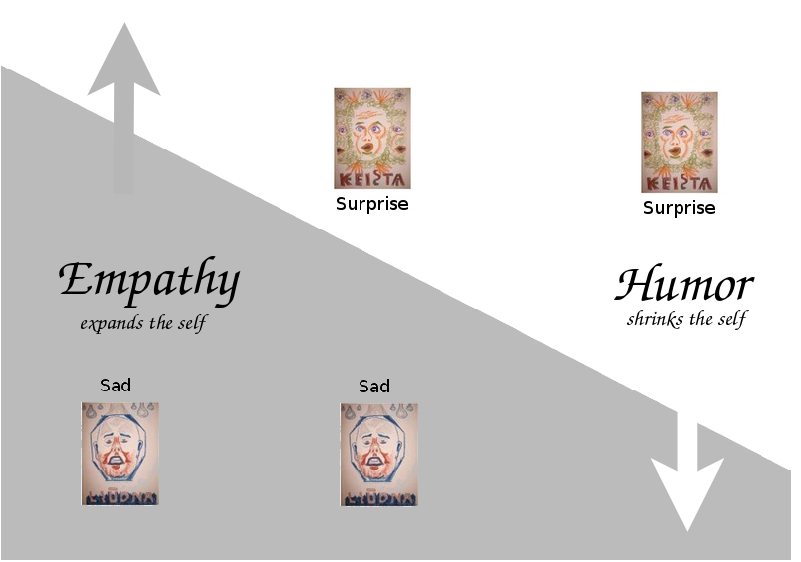
Both empathy and sympathy have us honor another person's expectations. However, empathy has us feel the same emotions because we place ourselves in the same shoes - we draw the same relevant distinctions between the self and the world. Indeed, empathy has us expand our own sense of self so that we identify more broadly. Instead of feeling surprised that somebody died, we feel sad with their children that they did. As our self grows, our life feels ever more personal and serious.
In contrast, humor is a strategy that has us escape sadness by shrinking ourselves. What was sad is simply surprising when we put some distance on it. This disappearance of sadness is what feels funny and makes us laugh. If sadness is hard to bear, and we seek to avoid it, then humor is much better than hate. However, sadness is a healthy emotion, and humor for its own sake easily veers into hate.
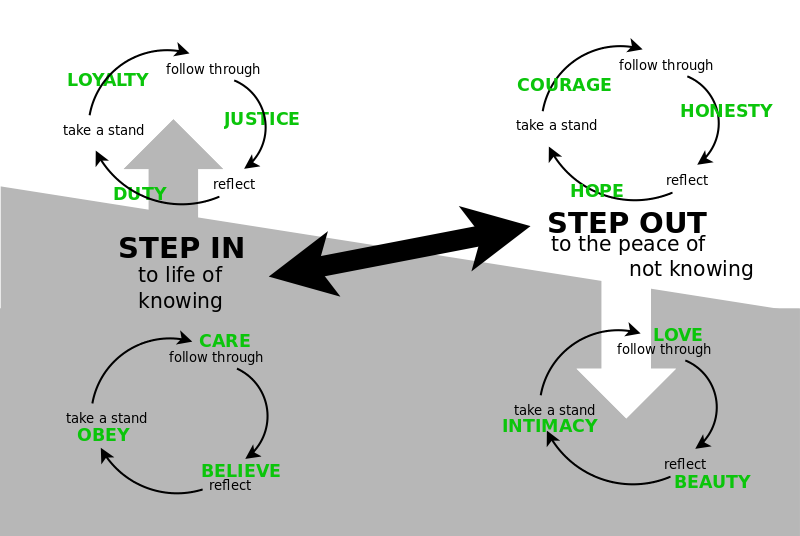
Our self is what we know, and our world is what we don't. We are destined to grow forever by expressing what we don't know in terms of what we know. If we listen to our feelings, then we can grow aware of ourselves and learn that our expectations are not exactly what we want and we can adjust them accordingly.
Thus we step out of ourselves, and think rationally, by letting go of our personal prejudices, biases, and self-interests, and then finding a sense of peace from which we can best adjust ourselves, who we should be. Then we can step into ourselves and lock in our expectations so that we authentically learn from them by taking a stand, following through and reflecting. If we internalize justice as obedience, loyalty as belief, and duty as caring, then we will objectively transform our souls, as if tuning ourselves as musical instruments, so that the positive moral tones of beauty, love and intimacy, will resound in us as virtues: courage, hope and honesty.
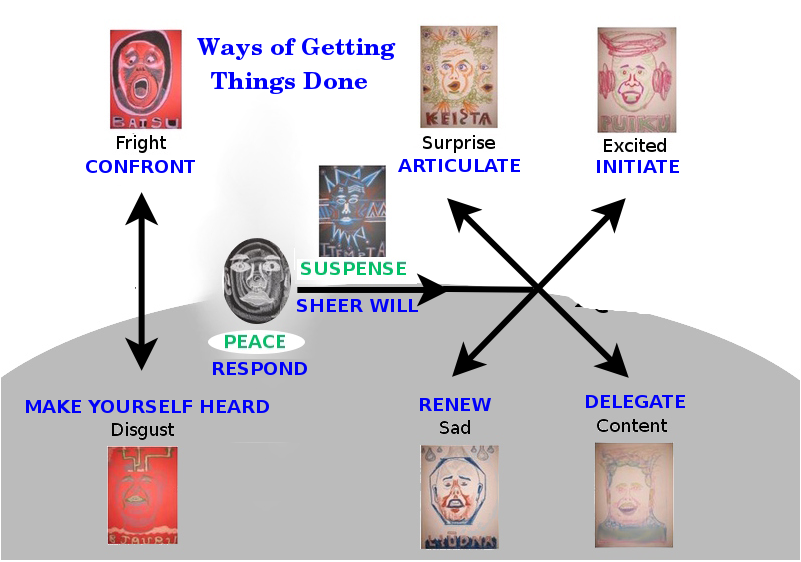
Our emotional responses can thus serve as cues for us to get things done with others. Here are some initial maxims which I and Joe Damal came up with as community organizers in Chicago and which play with the sense in which we are all one: when happy - delegate, excited - initiate, surprised - articulate, sad - renew, frightened - confront, disgusted - make ourselves heard, in suspense - exercise sheer will, and at peace - respond.
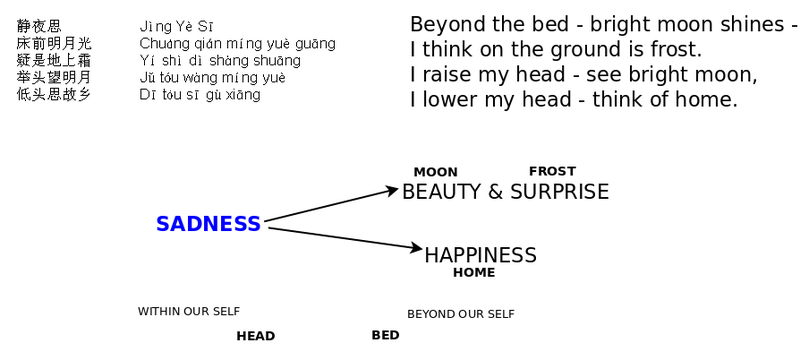
Psychologists only distinguish between good moods and bad moods. But let us now investigate how our expectations can give rise to a language of thousands of moods. We might study music, dreams, activities, but especially, poetry. Are two people able to interpret a poem in the same way so that it evokes the same mood?
Quiet Night Thoughts, by Chinese poet Li Bai of the Tang Dynasty, is a classic poem about his travels far from home.
Beyond the bed - bright moon shines - I think on the ground is frost. I raise my head - see bright moon, I lower my head - think of home.
Note how this poem organizes the spaces for our expectations. The bed is a boundary beyond which we feel the moon is beautiful and the frost is surprising. The poet's neck, which raises and lowers his head, is yet another boundary. The poet thinks of home, which is dear to him, and of itself that surely makes him happy. Yet when he contemplates that his home is so distant, it is sad to think that he is here and not there. Overall, we can specify a mood of conditional sadness, which depends on his reflection on his great distance from his happiness, as measured by the beauty of the moon and the surprise of the frost.
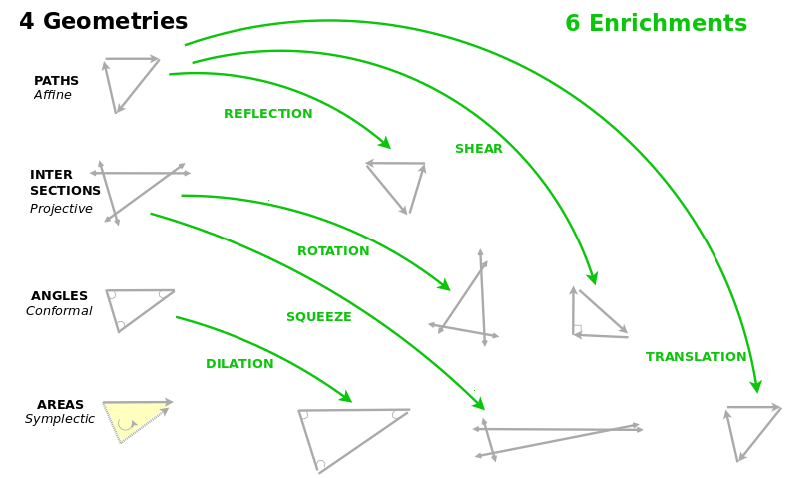
I made a study of 37 classic four-line wujue poems from the Tang dynasty. Each poem made use of one of six different transformations of the boundary that defines the self and world which are familiar to geometers: reflection, shear, rotation, dilation, squeeze and translation. These transformations are six ways of enriching a geometry. In the simplest affine geometry, a triangle consists of three paths from A to B to C. In a projective geometry, it consists of lines intersecting at A and B and C. In a conformal geometry, it is formed by angles at A and B and C. And in a symplectic geometry, it is an oriented area defined by A and B and C. A reflection allows us to look back upon ourselves. A shear transformation lets our view be perpendicular to that of another who sees what we don't see. A rotation lets our view dance from point to point. A dilation has our view expand it, whereas a squeeze transformation has it keep the same area but recast the proportions of its shape. A translation has us move to a new situation. I simply wish to suggest that conceptual geometry is the key to an interpretation of the situations which define the boundary between our selves and our world which determines our mood.
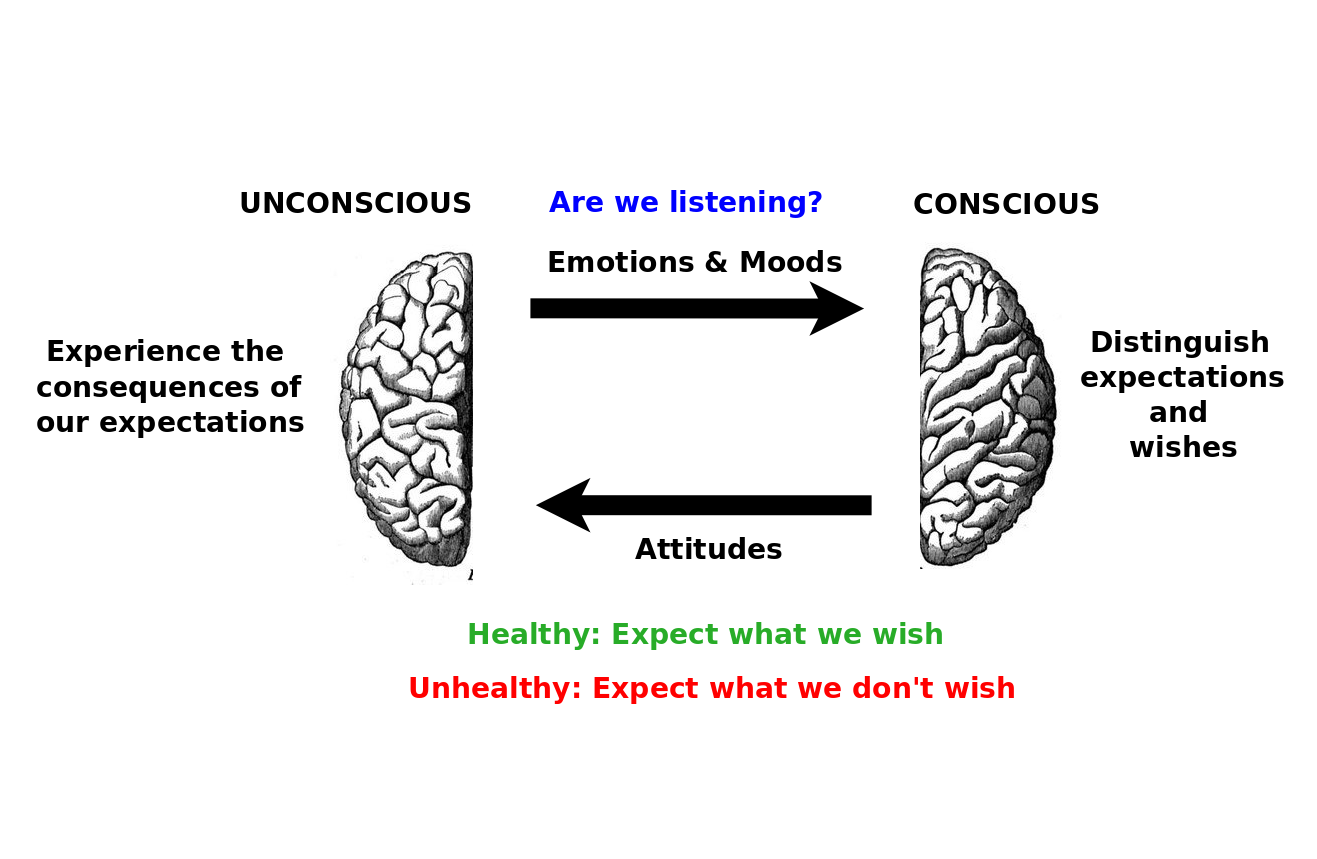
We are usually not consciously aware of our expectations but our emotions make us aware of them at the relevant time. By listening to our moods we can tease apart our expectations and transform unhealthy ones into healthy ones so that in every way we expect what we truly wish. We grow more sensitive and also our principles prove more sound. Whereas those who escape their moods, for example, by turning to cigarettes, alcohol or drugs, are evidently stunting themselves.
We often don't know why we feel the way we do. It's often not clear if we are responsible for our mood or if it is simply random. Yet it seems healthy to listen to our moods and try to learn from them, to groom our feelings, to tune ourselves like musical instruments. It seems that our unconscious mind challenges our conscious mind by showing what its principles look like under the light of a variety of different moods. This way we don't have to learn everything from experience. This seems to be the purpose of our moods. A Chinese poet's principles may lead him to journey to some distant province and yet his moods may have him question himself.
I invite us to work together to analyze hundreds of poems and discover a geometry of moods.
Acknowledgement
Thank you to Sylvain Poirier for his online notes about geometry from which I made use of the six transformations he described.
